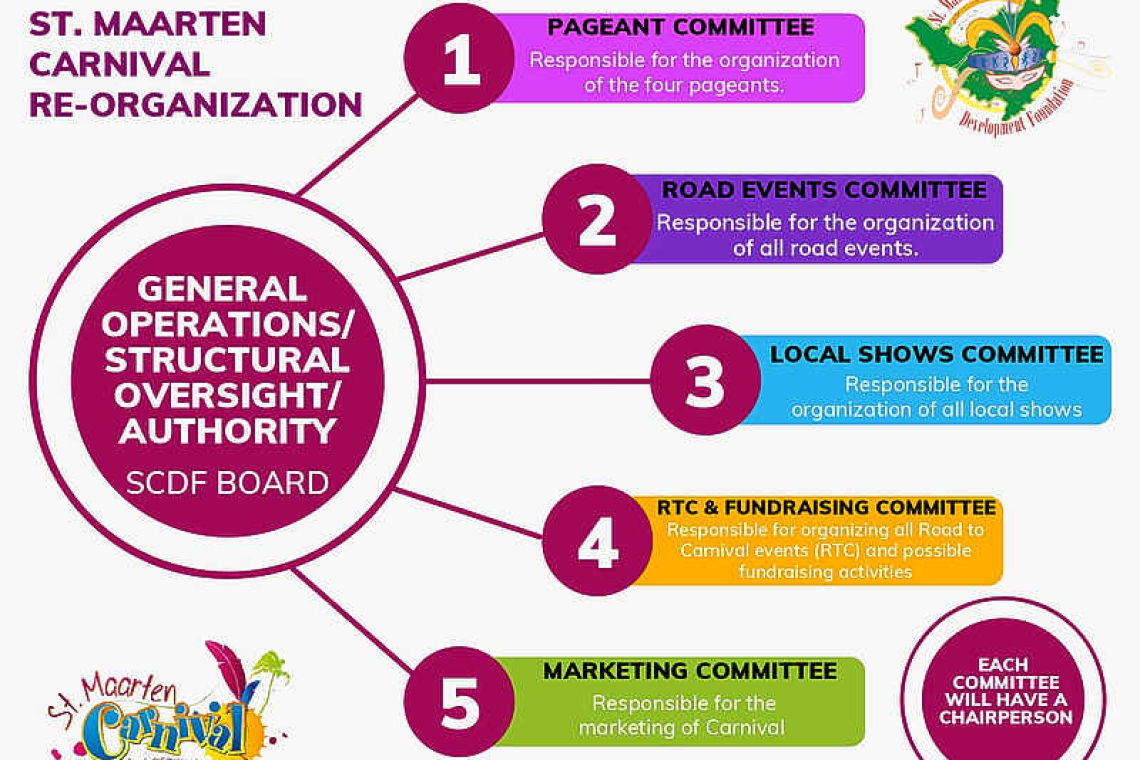Carnival’s re-organisation with the five committees under the oversight umbrella of the SCDF board.
PHILIPSBURG--St. Maarten Carnival Development Foundation (SCDF) has started a reorganisation of its operations with the goal of increasing efficiency and bringing in individuals who share a dedication of fostering culture and who will help lead Carnival to its next stage of development.
Complete implementation is targeted for August 2023 to go into effect for Carnival 2024.
SCDF said it is finally able to put into action its “reset plans,” which have been on the table since Carnival 2019, according to Edwardo Radjouki, president of the foundation. Changes that SCDF believes are essential for the festival’s future development had been put off because of the coronavirus.
He explained that Article 10 of the Articles of Incorporation of the (SCDF) is the premise of its re-organisation efforts. This article authorizes the foundation to appoint work group committees as it sees fit to perform tasks as indicated by the board of SCDF. With inclusion being an important part of its core, the foundation developed a plan around formation of committees.
Radjouki explained that the foundation will expand with five committees under the oversight umbrella of the board of the SCDF. These committees are a Pageant Committee, Road Events Committee, Marketing Committee, Local/Cultural Shows Committee and RTC (Road to Carnival)/Fundraising Committee. Each committee will have its own chairperson and all committees will be governed by strict guidelines.
The board of the SCDF will maintain its general authority over all operations including corporate relations with the private sector and public sector. And though committees will have a wide range of autonomy, all decisions by committees will have to be approved by the board prior to implementation. Radjouki also disclosed that SCDF is also looking to appoint an advisory body to work alongside the board.
The goal, according to Radjouki, is to “improve efficiency, which will be needed for Carnival’s development, and to infuse the festival with new blood, new ideas, and new perspectives while protecting our culture as integral to the festival.”
He also noted that the recruitment of committee members will be done publicly and that a person’s background will be taken into consideration when determining their suitability for specific committees.
Radjouki continued that there are still far too many people who do not understand how they may contribute significantly to the festival in the context of broadening the foundation to include more people. “We have outsourced a lot of Carnival’s operations, and it has not turned out to be viable. So, in order to streamline and better manage organisation, planning, budgeting, and execution, we decided to take a more structured approach,” he stated.
He pointed out that the marketing committee will play a crucial role in the promotion and development of culture. “When we talk about marketing, we do not just mean to advertise the festival locally, regionally, and internationally; we also mean that our marketing must highlight the culture of Carnival. Not just images of bands and feathers on screens,” Radjouki said. “Also, how we have accepted other cultures as well. While Carnival is observed in the Caribbean in a variety of ways and under slightly different names, there is one aspect that unites all of the celebrations: the expression of cultural diversity among the participants. This ought to serve as the cornerstone of our marketing strategies,” he added.
On the socio-economic level, he explained, is that Carnival generates business opportunities for singers, song writers, choreographers, costume builders and designers, make-up artists and musicians, to name a few. Even more importantly Carnival has driven the growth and development of micro, small and medium enterprises (MSMEs), many of which are skills-based services. These range from entertainment services related to cultural art forms such as dance, to the production of local crafts, cuisine, the orchestration of steel pans.
“Despite these realities, however, there are still too many in the private sector that do not understand how or why they should contribute to Carnival,” said Radjouki. He lamented that on a certain level, division exists in the business community where an attitude of “Carnival isn’t for me” exists. “In this regard our fundraising committee will have its job cut out for it in showing businesses from small to large why and how they can contribute.”
“Corporate support needs to be discussed differently in order for everyone to benefit and for culture to advance. Like any tradition, Carnival must keep up with the times in order to not only maintain its existence but also expand its reach and attract larger audiences.
“We must never lose sight of the fact that Carnival is more than just fun and music. It is a tool for promoting culture and having a social impact. Our committees will work towards bringing this into focus for all involved,” Radjouki concluded.







